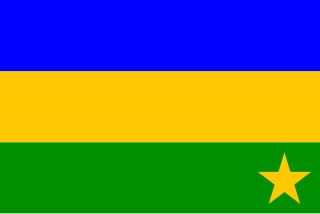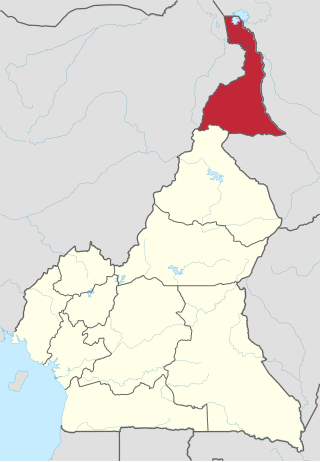
The Kanuri people are an African ethnic group living largely in the lands of the former Kanem and Bornu Empires in Niger, Nigeria, Chad, and Cameroon. As well as a diaspora community residing in Sudan. Those generally termed Kanuri include several subgroups and dialect groups, some of whom identify as distinct from the Kanuri. Most trace their origins to ruling lineages of the medieval Kanem-Bornu Empire, and its client states or provinces. In contrast to the neighboring Toubou or Zaghawa pastoralists, Kanuri groups have traditionally been sedentary, engaging in farming, fishing the Chad Basin, trade, and salt processing.

Adamawa State is a state in the North-East geopolitical zone of Nigeria, bordered by Borno to the northwest, Gombe to the west for 95 km, and Taraba to the southwest for about 366 km, while its eastern border forms part of the national border with Cameroon across the Atlantica Mountains for about 712 km. It takes its name from the historic emirate of Adamawa, with the emirate's old capital of Yola, serving as the capital city of Adamawa state. The state is one of the most heterogeneous in Nigeria, with over 100 indigenous ethnic groups. It was formed in 1991, when the former Gongola state was divided into Adamawa and Taraba states. Since it was carved out of the old Gongola State in 1991 by the General Ibrahim Badamsi Babangida military regime, Adamawa State has had 10 men, both military and civilian, controlling the levers of power, who played crucial roles in transforming the state into what it is today.

The Biu–Mandara or Central Chadic languages of the Afro-Asiatic family are spoken in Nigeria, Chad and Cameroon.

The North Region makes up 66,090 km2 of the northern half of The Republic of Cameroon. Neighbouring territories include the Far North Region to the north, the Adamawa Region to the south, Nigeria to the west, Chad to the east, and Central African Republic to the southeast. The city of Garoua is both the political and industrial capital. Garoua is Cameroon's third largest port, despite the fact that the Bénoué River upon which it relies is only navigable for short periods of the year.

Borno State is a state in the North-East geopolitical zone of Nigeria, bordered by Yobe to the west for about 421 km, Gombe to the southwest for 93 km, and Adamawa to the south while its eastern border forms part of the national border with Cameroon for about 426 km, its northern border forms part of the national border with Niger, for about 223 km mostly across the Komadougou-Yobe River, and its northeastern border forms all of the national border with Chad for 85 km, being the only Nigerian state to border three foreign countries. It takes its name from the historic emirate of Borno, with the emirate's old capital of Maiduguri serving as the capital city of Borno State. The state was formed in 1976 when the former North-Eastern State was broken up. It originally included the area that is now Yobe State, which became a distinct state in 1991.

The Kirdi are the many cultures and ethnic groups who inhabit northwestern Cameroon and northeastern Nigeria.

Kapsiki (Ka-Tsepkye) is a people living on both sides of the border between North Cameroon and Northeast Nigeria. They are called Kapsiki in Cameroon, and Kamwe (Higi) in Nigeria. Together they amount to about 120,000 people. Their language, Psekiye or Kamwe, consists of eleven dialects including Nkafa, Sina, Ghye, Humsi, Dakwa and Tilli and belongs to the Chadic language family.

The Far North Region, also known as the Extreme North Region, is the northernmost and most populous constituent province of the Republic of Cameroon. It borders the North Region to the south, Chad to the east, and Nigeria to the west. The capital is Maroua.
Articles related to Nigeria include:

There are over 525 native languages spoken in Nigeria. The official language and most widely spoken lingua franca is English, which was the language of Colonial Nigeria. Nigerian Pidgin – an English-based creole – is spoken by over 60 million people.

The Musgum or Mulwi are a Chadic ethnic group in Cameroon and Chad. They speak Musgu, a Chadic language, which had 61,500 speakers in Cameroon in 1982 and 24,408 speakers in Chad in 1993. The Musgum call themselves Mulwi.
Kamwe is a Chadic language native to Adamawa State and Borno State of Nigeria as well as to North-Western Cameroon.

Christianity is the majority religion in Cameroon, with significant minorities of the adherents of Islam and traditional faiths.
Michika (Mwe-cika) is a town and Local Government Area in Adamawa State, Nigeria, it is the administrative headquarters of the local government. It is in Northern Adamawa State and located directly across the border from the famous tourist site of Mcedigyi in vecemwe Rhumsiki in Cameroon. Mwe-cika (Michika) is the fourth largest town in Adamawa State.

Margi, also known as Marghi and Marghi Central, is a Chadic language spoken in Nigeria, Cameroon, and Chad. It is perhaps the best described of the Biu–Mandara branch of that family. Marghi South language and Putai are closely related and sometimes considered dialects of Margi.
Lala is an Adamawa language of Nigeria.

The Mandara people, also known as Wandala or Mandwara, are a Central African traditionalist ethnic group found in north Cameroon northeastern Nigeria, and southeastern Chad. They speak the Wandala language, which belongs to the Chadic branch of Afro-Asiatic languages found in northeastern Africa.
The Waja people are one of the ethnic groups in Gombe area of Nigeria that were the early inhabitants of the region. They inhabited the east-southern corner of Gombe state, occupying the present Balanga local government area of the state. The Waja people are the occupants of the Waja district which spread over an area of 330 square miles (850 km2).
The Kamwe people is a Chadic language speaking group, native to Adamawa State and Borno State of Nigeria and Northwest Cameroon. The Kamwe Language is called Vecemwe in the native tongue. Kamwe is a compound word formed of 'Ka' and 'Mwe' meaning people of the same consanguinity and affinity. The Kamwe are industrious and enterprising. They are usually equated to the Igbos of South Eastern Nigeria
The Kibaku people are an ethnic group inhabiting the Chibok Local Government Area, in eastern Borno State in Nigeria.













